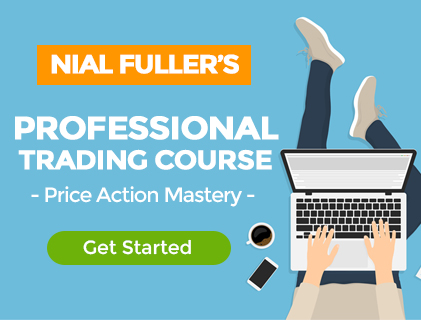 Your trading account balance becomes more important as you improve your trading skills than when you were just starting out, but you have to put real money at risk to improve and learn. This is dangerous in the early stages and can seriously damage your assets. account. Sounds like some kind of “cruel” paradox, doesn’t it?
Your trading account balance becomes more important as you improve your trading skills than when you were just starting out, but you have to put real money at risk to improve and learn. This is dangerous in the early stages and can seriously damage your assets. account. Sounds like some kind of “cruel” paradox, doesn’t it?
Even a skilled and accurate charter is of no use if you lose all your risk capital along the way. As you know, in the early stages of your trading career, focusing on learning to trade is not enough. You should also focus on maintaining your bankroll (the money in your account) and (ideally) building it slowly. And you know you have enough money to properly utilize your future trading capacity.
It is common to see traders who exhaust their accounts early on and after a few years have a very keen eye for predicting price movements and have little or no money to trade.
This lesson will look at the importance of capital in your trading account and how to protect it and stay in the game long enough to reach your goal of becoming a stable and profitable trader. is intended for
Can you and your funds survive long enough?
When you spend enough time analyzing and observing price movements on the charts, eventually things really start to make sense and you can observe the markets like a professional trader. However, as the title of this lesson suggests, all experience, screen time and education in the world is meaningless if your bankroll is intact by the time you reach the point of trading. Mastery.
If you decide to skydive alone for the first time and jump out of an airplane without prior training, guidance and practice from an experienced skydiver, it can be suicidal. The same is true for traders who jump straight into the market and trade real money without formal training, which is financial suicide. But every day, a large number of retail traders do it.
For some reason, most traders don’t seem to connect the dots that they need the funds they need to trade in order to survive and generate long-term profits in their trading. Therefore, I am here to help you, an aspiring trader, truly understand the importance of protecting capital in your trading account and, just as importantly, how to do so. I want to
The capital is the entrance fee, and you can’t play without a ticket.
Have you ever heard the saying, “You have to pay to play”? Well, that applies to everything, but especially trading. You can’t make money without money.
Think of your trading account balance as an entrance fee to the market. A daily ticket to see, learn and improve. If you run out of money, you won’t be able to buy a ticket, and your learning journey and career are all but over.
Clearly, many traders run out of real funds needed to trade and do stupid things like fund their trading accounts with credit, but this is just plain insanity and they can start making money faster than you can imagine. you will be digging a grave. Never do this.
This leads us to our next point…
What should we risk?
This is not my position as there are many complicating factors involved, so I won’t go into how much risk I take per trade or what percentage of my account I trade. However, in the early stages of your trading career, make sure you can survive losing 50 or 100 trades and still have a decent amount left in your account. Remember you have to survive. That’s the only goal here, not profit (yet), but capital preservation at all costs. As I learn and grow as a trader, I try to keep my trading capital for as long as possible so that I still have money to trade using my growing skills.
I would also like you to take a look at our overall net worth. Compare your income to your monthly bill, how much money you really need to risk right now, and how much you need to spend each year out of your disposable income and savings to continue your trading pursuits and learning journey. Decide what to invest in.
Once you know your financial situation, budget accordingly, stick to that plan, and don’t deviate like a gambler. Think about what you have in your account today and what you put in your account monthly/yearly. Otherwise, you will go bankrupt and ruin your chances of success. Investing in trading must be methodical and disciplined, and monthly/yearly capital planning must be adhered to. Most importantly, don’t put money into a trade that you can’t afford to lose or if you lose it, your life will be seriously affected. Especially if you don’t fully understand what you are doing, never do it.
Don’t run out of ammo. Plan for long battles.
It’s no secret that I love military tropes to teach traders the mindset they need. Those of you who follow my blog know that I am a fan of the sniper trading approach. The sniper trading approach is inherently a low frequency, high confidence trading style. Trading is a war against one another that has been going on for decades, so it requires long-term inventory, preparation and planning, and digging. If you have money in your account, you have ammunition to participate in battles, but if you run out of ammo, you obviously cannot win the battle.
Trade small positions initially
Whatever lot size you’re currently trading, even if you feel comfortable with it, it’s a good idea to consider reducing it by 50% or 75%, step back and start doing the math. increase.
Where would you be if you risked your current state and lost 10 trades in a row? Will you survive or swoop in? Do you have enough ammo in reserve to get through? Think logically and don’t believe that you can somehow become the lucky one who never experiences a drawdown. Because the drawdown can and will happen anytime.
I explained in my recent article why a wider stop loss is necessary. You can trade with wide or tight stops and risk the same amount, but ultimately it is determined by the size of your position. Changing the contract/lot traded changes the dollar risk. It’s that simple.
Novice traders are wise to start with a very small amount of risk compared to their overall capital and increase the risk gradually over several years as their skill, confidence and trading account grow.
generally smarter deals
To play your “strong hand” (a poker metaphor), choose the best price action pattern that you understand, understand the charts and have a knack for trading successfully, and stick to it. Please take your time and master it. Know your strengths and don’t deviate from them just because you can. Apply discipline.
Don’t be aggressive all the time, be defensive too. Play a long game and make it to the end. Don’t think there are shortcuts (there really aren’t!). You should always think about risk as well as reward.
Don’t let your subconscious fool you
In other words, we managed to win a series of trades. well done! But relax, slow down and take a deep breath. It’s not going to be this easy, so you better believe it. A series of winners should be prepared to return to normal and not overexpose themselves because of their confidence. Think of the winning streak as a “blessing” and remember that trade outcomes for a given trading edge are randomly distributed (so a streak of losers could be just around the corner).
Remember, the easiest to find and most confident deals are the ones you should worry about. Don’t bet big on trades that make you appear overconfident, as the market often “tricks” you to fail. Because it is the most risky deal.
I’m not saying that you should overthink or analyze potential trades too much. Still, we want you to play with the most obvious setup. but, I I’m saying you shouldn’t double up on those obvious things just because “I think they’re good.” Because any transaction can go wrong and just one misplaced card is enough to bring a house down.
Once you have confirmed quality trade setups that comply with your predefined risk parameters and meet your trading plan, Please enter with confidence.
Choose trade-offs onlyRing Sound Risk Rewards.
If you want to maintain your bankroll, you should only choose trades that offer a good risk/reward ratio. If you don’t know what the risk-reward ratio means, see my article on risk-reward and money management.
Ideally, you will only engage in trades that offer a reasonable risk reward of 1-1.5 or 1-2 or higher. Once you start trading with a risk reward of 1:1 or less, it becomes incredibly difficult or impossible to make money and maintain/build your bankroll in the long run.
Don’t risk your money with “Hero Trade”. WARNING: You will be tempted.
When everyone thinks ‘the market can’t keep moving in that direction’, you can make a lot more money trading with the trend than trying to pick peaks and troughs.
Remember this. Markets can, and often do, go further than you think. These big moves take time to unfold and so many amateur traders will bet against the trend thinking it will end every time it goes up or down. So sometimes contrarians actually follow the “herd” because everyone else is betting against them.
The next time you want to waste your trading account bullets trying to be the hero and pick the next big reversal in a one-way market, take a step back and ask if it’s worth it in the long-term scheme of things. Please think about it. Your aim is to survive financially, not to boost your ego.
Conclusion
When it comes to long-term trading success, one factor outperforms the others. It’s capital preservation. Many traders use up a lot of money in the early days, and by the time they realize what they’re doing, they don’t have the trading capital to properly use their abilities. Also, having run out of money in the early days of trading, many traders simply think “trading is too hard” or “impossible” before they really understand what they are doing. I give up.
No matter how you look at it, you should be especially careful when you first start trading real money, as emotions are high, expectations are high, and expectations may not align with reality. You have two options. Either listen to the insights shared in today’s lesson and extended in the professional trading course, or listen and act. There really is no middle ground. After all, only you know how much money you can lose, both financially and mentally, and whether or not you can get into trading games in the long run. Therefore, it is up to you to make the call and do what is necessary because no one but you can stop your trading account from blowing up.
Leave a comment below with your thoughts on this lesson…
If you have any questions, please contact us.




